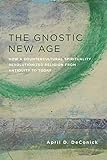The Gnostic New Age : How a Countercultural Spirituality Revolutionized Religion from Antiquity to Today / April DeConick.
Material type: TextPublisher: New York, NY : Columbia University Press, [2017]Copyright date: ©2016Description: 1 online resource (392 p.) : 40 b&w illustrationsContent type:
TextPublisher: New York, NY : Columbia University Press, [2017]Copyright date: ©2016Description: 1 online resource (392 p.) : 40 b&w illustrationsContent type: - 9780231170765
- 9780231542043
- 299/.932
- B638 .D4 2016
- online - DeGruyter
- Issued also in print.
| Item type | Current library | Call number | URL | Status | Notes | Barcode | |
|---|---|---|---|---|---|---|---|
 eBook
eBook
|
Biblioteca "Angelicum" Pont. Univ. S.Tommaso d'Aquino Nuvola online | online - DeGruyter (Browse shelf(Opens below)) | Online access | Not for loan (Accesso limitato) | Accesso per gli utenti autorizzati / Access for authorized users | (dgr)9780231542043 |
Browsing Biblioteca "Angelicum" Pont. Univ. S.Tommaso d'Aquino shelves, Shelving location: Nuvola online Close shelf browser (Hides shelf browser)

|

|

|

|

|

|

|
||
| online - DeGruyter Chinese History and Culture : Sixth Century B.C.E. to Seventeenth Century, Volume 1 / | online - DeGruyter Too Little, Too Late : The Quest to Resolve Sovereign Debt Crises / | online - DeGruyter In Search of the Lost Orient : An Interview / | online - DeGruyter The Gnostic New Age : How a Countercultural Spirituality Revolutionized Religion from Antiquity to Today / | online - DeGruyter Horses, Horses, in the End the Light Remains Pure : A Tale That Begins with Fukushima / | online - DeGruyter Love in the Dark : Philosophy by Another Name / | online - DeGruyter Friendship Reconsidered : What It Means and How It Matters to Politics / |
Frontmatter -- Contents -- Acknowledgments -- Introduction -- Chapter One. The Matrix of Ancient Spirituality -- Chapter Two. The Gnostic True Man -- Chapter Three. Superpowers and Monsters -- Chapter Four. Paul and Gnostic Dogma -- Chapter Five. John and the Dark Cosmos -- Chapter Six. Gnostic Altered States -- Chapter Seven. Hell Walks and Star Treks -- Chapter Eight. Spiritual Avatars -- Chapter Nine. The Pi of Politics -- Chapter Ten. Pleasantville Religions -- Chapter Eleven. Gnosticism Out on a Limb -- Bibliography -- English Translations of Gnostic Sources -- Filmography -- Index
restricted access online access with authorization star
http://purl.org/coar/access_right/c_16ec
Gnosticism is a countercultural spirituality that forever changed the practice of Christianity. Before it emerged in the second century, passage to the afterlife required obedience to God and king. Gnosticism proposed that human beings were manifestations of the divine, unsettling the hierarchical foundations of the ancient world. Subversive and revolutionary, Gnostics taught that prayer and mediation could bring human beings into an ecstatic spiritual union with a transcendent deity. This mystical strain affected not just Christianity but many other religions, and it characterizes our understanding of the purpose and meaning of religion today.In The Gnostic New Age, April D. DeConick recovers this vibrant underground history to prove that Gnosticism was not suppressed or defeated by the Catholic Church long ago, nor was the movement a fabrication to justify the violent repression of alternative forms of Christianity. Gnosticism alleviated human suffering, soothing feelings of existential brokenness and alienation through the promise of renewal as God. DeConick begins in ancient Egypt and follows with the rise of Gnosticism in the Middle Ages, the advent of theosophy and other occult movements in the nineteenth and early twentieth centuries, and contemporary New Age spiritual philosophies. As these theories find expression in science-fiction and fantasy films, DeConick sees evidence of Gnosticism's next incarnation. Her work emphasizes the universal, countercultural appeal of a movement that embodies much more than a simple challenge to religious authority.
Issued also in print.
Mode of access: Internet via World Wide Web.
In English.
Description based on online resource; title from PDF title page (publisher's Web site, viewed 02. Mrz 2022)


